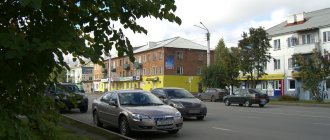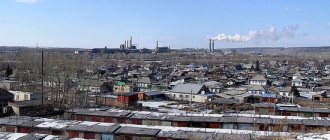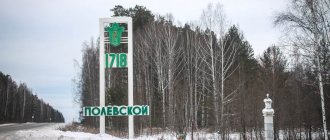There are many small towns in Russia with a long and interesting history, and the city of Buzuluk can be counted among them.
The city was founded in 1736, 150 Cossacks served and lived in it at that time, but currently Buzuluk has up to 86 thousand inhabitants.
The expedition led by Ivan Kirillovich Kirillov (geographer, historian, statesman) founded a number of fortresses, including on the left tributary of the Samara , on the Buzuluk . The fortresses were supposed to secure the southeastern borders from raids by nomads and protect the road to Orenburg.
The Buzuluk fortress was surrounded by a large rampart, surrounded by a moat and had log walls on which cannons were placed on top. It was built of wood, and the fire of 1785 destroyed almost the entire city. After this, the fortress was not restored, the city was not surrounded, and the ditch was filled up.
The city is rich in attractions.
Water tower
It is located near the pedagogical college, on Lenin, 67. Made in the same pseudo-Gothic style and designed by the same architect. Date of construction: 1905.
photo from the site: 7 wonders of Buzuluk
In the city center, at the intersection of Yarosha and Chapaeva streets, there is another building with an interesting facade, built of red brick. This is the former Men's Real School.
Buzuluk on the map of Russia, geography, nature and climate
On the map of Russia, Buzuluk can be found northwest of the regional center and southeast of Samara.
The city is located at the picturesque confluence of the Samara , Domashka and Buzuluk .
The nature of the area is atypical for southern latitudes: steppe vegetation neighbors the Buzuluksky forest, the southernmost natural coniferous forest in Russia.
The climate is sharply continental: winters are harsh and long; summer is hot, dry, but short-lived.
Men's real school.
The building was built in 1911. A.S. Pushkin stayed there, during the Soviet years there was a school, and during the Great Patriotic War there was an evacuation hospital.
photo from the site: 7 wonders of Buzuluk
The local history museum on Lenina, 56 participates in the all-Russian “Night of Museums” program; photo exhibitions are also held here.
The building of the former Zemstvo Government.
The façade of the building is made in the pompous Russian Art Nouveau style and is undoubtedly a decoration of the city. It is believed that the building was built by captured Austrians, who were given freedom and secretly (unofficially) sent to their homeland. In 1917, it hosted the district congress of workers and peasants' deputies; during the Great Patriotic War, the headquarters of the armed forces of the Polish Republic (Anders' Army) was located. Nowadays, an industrial and pedagogical college has settled here.
photo from the site: 7 wonders of Buzuluk
Address: st. May 1, 35.
St. Tikhvin Convent
The first monastery built in the Orenburg region, built in 1857, received official status in 1859. By 1890, the number of buildings in it increased - there were already economic services, several churches, and fences.
photo from the site: 7 wonders of Buzuluk
Like many other churches, in 1920 the monastery was looted and destroyed. Then the religious buildings were used for various needs. In one of the temples of the complex there was a power plant, in the 30s there was a transit prison, and at the end of the last century there was an energy enterprise. At the turn of the 20th–21st centuries, the temple complex began to be restored. The main shrines of the monastery, which you can familiarize yourself with, are the Tikhvin Icon of the Mother of God and the icon of St. Seraphim of Sarov with a particle of his relics.
Address: Buzuluk, st. Sergo, 1.
Excerpt characterizing Buzuluk
“Natasha, lie down in the middle,” said Sonya. “No, I’m here,” Natasha said. “Go to bed,” she added with annoyance. And she buried her face in the pillow. The Countess, m me Schoss and Sonya hastily undressed and lay down. One lamp remained in the room. But in the yard it was getting brighter from the fire of Malye Mytishchi, two miles away, and the drunken cries of the people were buzzing in the tavern, which Mamon’s Cossacks had smashed, on the crossroads, on the street, and the incessant groan of the adjutant was heard. Natasha listened for a long time to the internal and external sounds coming to her, and did not move. She heard first the prayer and sighs of her mother, the cracking of her bed under her, the familiar whistling snoring of m me Schoss, the quiet breathing of Sonya. Then the Countess called out to Natasha. Natasha did not answer her. “He seems to be sleeping, mom,” Sonya answered quietly. The Countess, after being silent for a while, called out again, but no one answered her. Soon after this, Natasha heard her mother's even breathing. Natasha did not move, despite the fact that her small bare foot, having escaped from under the blanket, was chilly on the bare floor. As if celebrating victory over everyone, a cricket screamed in the crack. The rooster crowed far away, and loved ones responded. The screams died down in the tavern, only the same adjutant's stand could be heard. Natasha stood up. - Sonya? are you sleeping? Mother? – she whispered. No one answered. Natasha slowly and carefully stood up, crossed herself and stepped carefully with her narrow and flexible bare foot onto the dirty, cold floor. The floorboard creaked. She, quickly moving her feet, ran a few steps like a kitten and grabbed the cold door bracket. It seemed to her that something heavy, striking evenly, was knocking on all the walls of the hut: it was her heart, frozen with fear, with horror and love, beating, bursting. She opened the door, crossed the threshold and stepped onto the damp, cold ground of the hallway. The gripping cold refreshed her. She felt the sleeping man with her bare foot, stepped over him and opened the door to the hut where Prince Andrei lay. It was dark in this hut. In the back corner of the bed, on which something was lying, there was a tallow candle on a bench that had burned out like a large mushroom. Natasha, in the morning, when they told her about the wound and the presence of Prince Andrei, decided that she should see him. She did not know what it was for, but she knew that the meeting would be painful, and she was even more convinced that it was necessary. All day she lived only in the hope that at night she would see him. But now, when this moment came, the horror of what she would see came over her. How was he mutilated? What was left of him? Was he like that incessant groan of the adjutant? Yes, he was like that. He was in her imagination the personification of this terrible groan. When she saw an obscure mass in the corner and mistook his raised knees under the blanket for his shoulders, she imagined some kind of terrible body and stopped in horror. But an irresistible force pulled her forward. She carefully took one step, then another, and found herself in the middle of a small, cluttered hut. In the hut, under the icons, another person was lying on the benches (it was Timokhin), and two more people were lying on the floor (these were the doctor and the valet). The valet stood up and whispered something. Timokhin, suffering from pain in his wounded leg, did not sleep and looked with all his eyes at the strange appearance of a girl in a poor shirt, jacket and eternal cap. The sleepy and frightened words of the valet; “What do you need, why?” - they only forced Natasha to quickly approach what was lying in the corner. No matter how scary or unlike a human this body was, she had to see it. She passed the valet: the burnt mushroom of the candle fell off, and she clearly saw Prince Andrei lying with his arms outstretched on the blanket, just as she had always seen him. He was the same as always; but the inflamed color of his face, his sparkling eyes, fixed enthusiastically on her, and especially the tender child’s neck protruding from the folded collar of his shirt, gave him a special, innocent, childish appearance, which, however, she had never seen in Prince Andrei. She walked up to him and with a quick, flexible, youthful movement knelt down. He smiled and extended his hand to her. For Prince Andrei, seven days have passed since he woke up at the dressing station of the Borodino field. All this time he was in almost constant unconsciousness. The fever and inflammation of the intestines, which were damaged, in the opinion of the doctor traveling with the wounded man, should have carried him away. But on the seventh day he happily ate a slice of bread with tea, and the doctor noticed that the general fever had decreased. Prince Andrei regained consciousness in the morning. The first night after leaving Moscow it was quite warm, and Prince Andrei was left to spend the night in a carriage; but in Mytishchi the wounded man himself demanded to be carried out and to be given tea. The pain caused to him by being carried into the hut made Prince Andrei moan loudly and lose consciousness again. When they laid him on a camp bed, he lay for a long time with his eyes closed without moving. Then he opened them and quietly whispered: “What should I have for tea?” This memory for the small details of life amazed the doctor. He felt the pulse and, to his surprise and displeasure, noticed that the pulse was better. To his displeasure, the doctor noticed this because, from his experience, he was convinced that Prince Andrei could not live and that if he did not die now, he would only die with great suffering some time later. With Prince Andrei they were carrying the major of his regiment, Timokhin, who had joined them in Moscow with a red nose and was wounded in the leg in the same Battle of Borodino. With them rode a doctor, the prince's valet, his coachman and two orderlies. Prince Andrey was given tea. He drank greedily, looking ahead at the door with feverish eyes, as if trying to understand and remember something. - I don’t want anymore. Is Timokhin here? - he asked. Timokhin crawled towards him along the bench. - I'm here, your Excellency. - How's the wound? - Mine then? Nothing. Is that you? “Prince Andrei began to think again, as if remembering something. -Can I get a book? - he said. - Which book? - Gospel! I have no. The doctor promised to get it and began asking the prince about how he felt. Prince Andrei reluctantly, but wisely answered all the doctor’s questions and then said that he needed to put a cushion on him, otherwise it would be awkward and very painful. The doctor and the valet lifted the greatcoat with which he was covered and, wincing at the heavy smell of rotten meat spreading from the wound, began to examine this terrible place. The doctor was very dissatisfied with something, changed something differently, turned the wounded man over so that he groaned again and, from the pain while turning, again lost consciousness and began to rave. He kept talking about getting this book for him as soon as possible and putting it there. - And what does it cost you! - he said. “I don’t have it, please take it out and put it in for a minute,” he said in a pitiful voice. The doctor went out into the hallway to wash his hands. “Ah, shameless, really,” the doctor said to the valet, who was pouring water on his hands. “I just didn’t watch it for a minute.” After all, you put it directly on the wound. It’s such a pain that I’m surprised how he endures it. “It seems we set it up, Lord Jesus Christ,” said the valet. For the first time, Prince Andrei understood where he was and what had happened to him, and remembered that he had been wounded and how at that moment when the carriage stopped in Mytishchi, he asked to go to the hut. Confused again from pain, he came to his senses another time in the hut, when he was drinking tea, and then again, repeating in his memory everything that had happened to him, he most vividly imagined that moment at the dressing station when, at the sight of the suffering of a person he did not love, , these new thoughts came to him, promising him happiness. And these thoughts, although unclear and indefinite, now again took possession of his soul. He remembered that he now had new happiness and that this happiness had something in common with the Gospel. That's why he asked for the Gospel. But the bad situation that his wound had given him, the new upheaval, again confused his thoughts, and for the third time he woke up to life in the complete silence of the night. Everyone was sleeping around him. A cricket screamed through the entryway, someone was shouting and singing on the street, cockroaches rustled on the table and icons, in the autumn a thick fly beat on his headboard and near the tallow candle, which had burned like a large mushroom and stood next to him. His soul was not in a normal state. A healthy person usually thinks, feels and remembers simultaneously about a countless number of objects, but he has the power and strength, having chosen one series of thoughts or phenomena, to focus all his attention on this series of phenomena. A healthy person, in a moment of deepest thought, breaks away to say a polite word to the person who has entered, and again returns to his thoughts. The soul of Prince Andrei was not in a normal state in this regard. All the forces of his soul were more active, clearer than ever, but they acted outside of his will. The most diverse thoughts and ideas simultaneously possessed him. Sometimes his thought suddenly began to work, and with such strength, clarity and depth with which it had never been able to act in a healthy state; but suddenly, in the middle of her work, she broke off, was replaced by some unexpected idea, and there was no strength to return to it. “Yes, I have discovered a new happiness, inalienable from a person,” he thought, lying in a dark, quiet hut and looking ahead with feverishly open, fixed eyes. Happiness that is outside of material forces, outside of material external influences on a person, the happiness of one soul, the happiness of love! Every person can understand it, but only God can recognize and prescribe it. But how did God prescribe this law? Why son?.. And suddenly the train of these thoughts was interrupted, and Prince Andrei heard (not knowing whether he was in delirium or in reality he was hearing this), he heard some quiet, whispering voice, incessantly repeating in rhythm: “And drink piti drink” then “and ti tii” again “and piti piti piti” again “and ti ti.” At the same time, to the sound of this whispering music, Prince Andrei felt that some strange airy building made of thin needles or splinters was erected above his face, above the very middle. He felt (although it was difficult for him) that he had to diligently maintain his balance so that the building that was being erected would not collapse; but it still fell down and slowly rose again at the sounds of steadily whispering music. “It’s stretching!” stretches! stretches and everything stretches,” Prince Andrei said to himself. Along with listening to the whisper and feeling this stretching and rising building of needles, Prince Andrei saw in fits and starts the red light of a candle surrounded in a circle and heard the rustling of cockroaches and the rustling of a fly beating on the pillow and on his face. And every time the fly touched his face, it produced a burning sensation; but at the same time he was surprised by the fact that, hitting the very area of the building erected on his face, the fly did not destroy it. But besides this, there was one more important thing. It was white by the door, it was a sphinx statue that was also crushing him. “But maybe this is my shirt on the table,” thought Prince Andrei, “and these are my legs, and this is the door; but why is everything stretching and moving forward and piti piti piti and tit ti - and piti piti piti... - Enough, stop, please, leave it, - Prince Andrei begged someone heavily. And suddenly the thought and feeling emerged again with extraordinary clarity and strength. “Yes, love,” he thought again with perfect clarity), but not the love that loves for something, for something or for some reason, but the love that I experienced for the first time, when, dying, I saw my enemy and still fell in love with him. I experienced that feeling of love, which is the very essence of the soul and for which no object is needed. I still experience this blissful feeling. Love your neighbors, love your enemies. To love everything - to love God in all manifestations. You can love a dear person with human love; but only an enemy can be loved with divine love. And from this I experienced such joy when I felt that I loved that person. What about him? Is he alive... Loving with human love, you can move from love to hatred; but divine love cannot change. Nothing, not death, nothing can destroy it. She is the essence of the soul. And how many people have I hated in my life. And of all the people, I have never loved or hated anyone more than her.” And he vividly imagined Natasha, not as he had imagined her before, with only her charm, joyful for himself; but for the first time I imagined her soul. And he understood her feeling, her suffering, shame, repentance. Now for the first time he understood the cruelty of his refusal, saw the cruelty of his break with her. “If only I could see her one more time. Once, looking into those eyes, he said...” And piti piti piti and ti ti ti, and piti piti - boom, a fly hit... And his attention was suddenly transferred to another world of reality and delirium, in which something special was happening. Still in this world, everything was erected without collapsing, a building, something was still stretching, the same candle was burning with a red circle, the same sphinx shirt was lying at the door; but, besides all this, something creaked, there was a smell of fresh wind, and a new white sphinx, standing, appeared in front of the door. And in the head of this sphinx there was the pale face and sparkling eyes of the very Natasha about whom he was now thinking. “Oh, how heavy is this incessant nonsense!” - thought Prince Andrei, trying to banish this face from his imagination. But this face stood before him with the force of reality, and this face came closer. Prince Andrei wanted to return to the former world of pure thought, but he could not, and delirium pulled him into its realm. The quiet whispering voice continued its measured babble, something was pressing, stretching, and a strange face stood in front of him. Prince Andrey gathered all his strength to come to his senses; he moved, and suddenly his ears began to ring, his eyes grew dim, and he, like a man plunged into water, lost consciousness. When he woke up, Natasha, the same living Natasha, whom of all the people in the world he most wanted to love with that new, pure divine love that was now open to him, was kneeling before him. He realized that it was a living, real Natasha, and was not surprised, but was quietly happy. Natasha, on her knees, scared but chained (she could not move), looked at him, holding back her sobs. Her face was pale and motionless. Only in the lower part of it was something trembling.
Cathedral of St. Nicholas the Wonderworker
Years of construction: 1908–1910. Located near the railway station. The temple is very beautiful, but it is not authentic - it is a restored building, since it was partially destroyed in the 30s. Since 1990, the cathedral has been reopened to believers.
photo from the site: 7 wonders of Buzuluk
Address: Cathedral of St. Nicholas Myra of Lycian Wonderworker in Buzuluk
461040, Orenburg region, Buzuluk, st. 1st line, no. 57
temple: 8 (353-42) 5-04-04; 8 (353-42) 5-04-54
Routes on the map of Buzuluk. Transport infrastructure
The Buzuluka railway station was built on the route of trains from Orenburg to Kinel along the South Ural Road.
P224 highway .
The regional highway P246 , connecting Bugulma and Uralsk.
There are two main types of public transport within the city: buses and minibuses. They connect residential neighborhoods with socially significant facilities.






